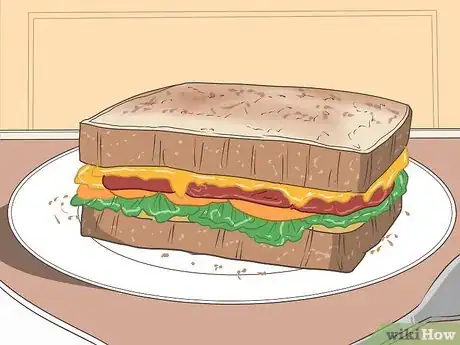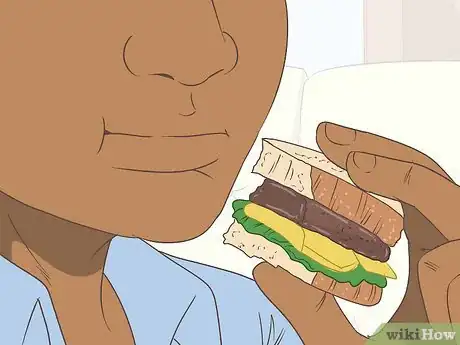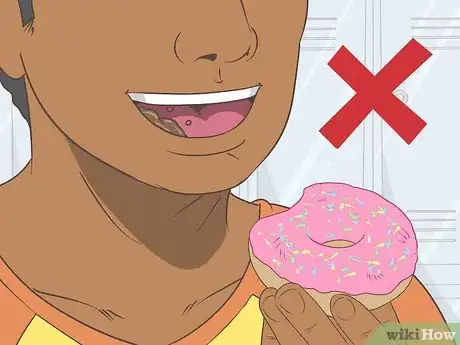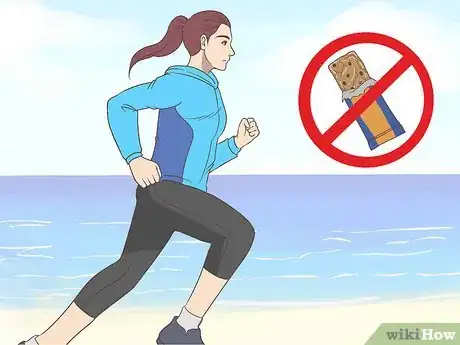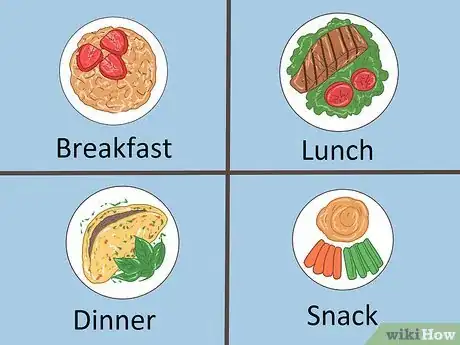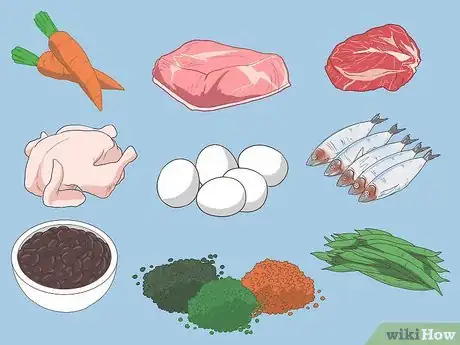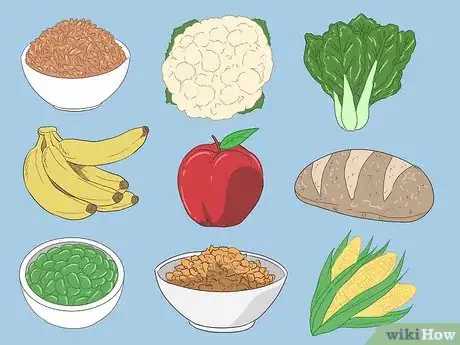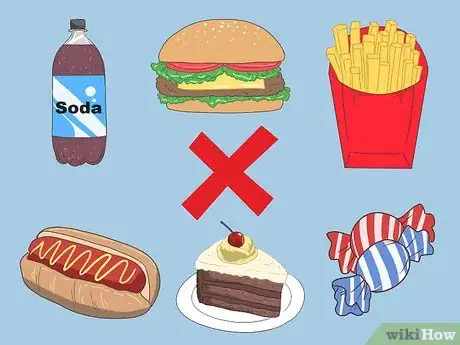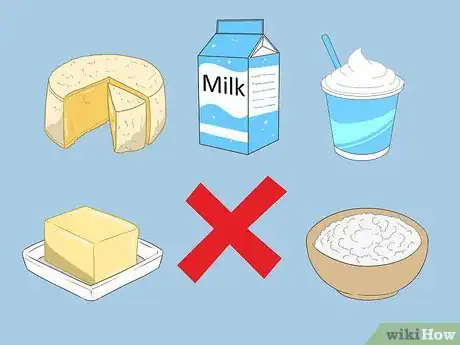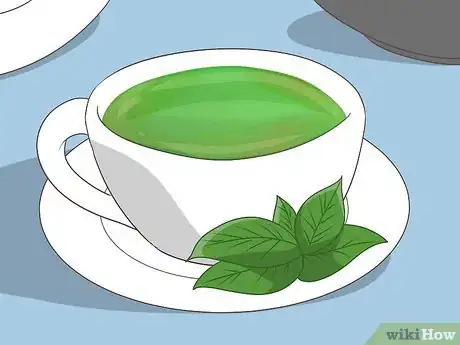This article was medically reviewed by Sarah Gehrke, RN, MS. Sarah Gehrke is a Registered Nurse and Licensed Massage Therapist in Texas. Sarah has over 10 years of experience teaching and practicing phlebotomy and intravenous (IV) therapy using physical, psychological, and emotional support. She received her Massage Therapist License from the Amarillo Massage Therapy Institute in 2008 and a M.S. in Nursing from the University of Phoenix in 2013.
There are 16 references cited in this article, which can be found at the bottom of the page.
This article has been viewed 49,913 times.
A growling stomach can certainly be annoying, especially if you are in the middle of something important. The Greeks called it “borborhygmi.” Although it is just the normal sound of your intestinal tract squeezing food through your digestive system, there are ways of turning the volume down on this process. Eating something is the simplest cure, but you may also want to avoid swallowing excessive air, skip carbonated beverages, and modify your diet.[1]
Steps
Quieting a Loud Stomach
-
1Take a deep breath before your stomach growls. Just before you feel your stomach rumbling, take a deep breath. Hold your breath for ten seconds, and then breathe out. When you take a deep breath, your diaphragm pushes down on your stomach. When pushed on, the stomach acts like a water balloon and protrudes in the opposite direction.[2]
- This may help with digestion by mobilizing the stomach contents and also helping air move through to the small intestine.
-
2Go to the bathroom before your big event. If you are nervous because of a meeting at work or a test at school, you might want to take a trip to the bathroom before the big event. Nervousness and anxiety increases the activity in your gut, so you may have to use the bathroom a little sooner than usual.[3]Advertisement
-
3Eat something to lower the volume on your gut. Your stomach may be telling you that you need to eat. Although eating isn't always the answer to a growling stomach, it will sometimes solve the problem. Since the squeezing of your intestinal tract gets louder when your small intestine is empty, you could turn the volume down by giving it some food to digest.[4]
Avoiding Air in the Stomach
-
1Eat with your mouth closed and chew thoroughly. One of the best ways of avoiding a growling stomach is by eating with your mouth closed and chewing thoroughly, which will prevent excess air from entering your digestive tract. As it turns out, there was a reason your parents told you to eat with your mouth closed.[5]
- Avoid large mouthfuls, which tend to be more difficult to digest.[6]
-
2Don't talk and eat at the same time. When you talk and eat simultaneously, you swallow too much air. Since excessive air in your stomach can lead to growling noises, you should avoid talking while you are eating. So, focus on your food and save your voice for after dinner.[7]
- If you are in a social situation, try taking smaller bites, chewing properly, swallowing, and then voicing your thoughts.
-
3Don't eat and exercise at the same time. If you are in the habit of eating protein bars or other snacks while you are exercising, kick this habit. You'll probably swallow excessive air while eating and exercising.
-
4Drink water instead of carbonated beverages. Pop, beer, mineral water, and other carbonated beverages contain little gaseous bubbles. Although carbonated beverages can be tasty, you'll end up consuming too much air with your meal if you drink them with lunch or dinner. They may end up giving you a growling stomach. Choose water instead, which actually aids in digestion.[8]
- Don't use a straw. A straw may lead you to consume too much air with your drink. Instead, drink straight from the glass.[9]
-
5Find out how much water you need to drink per day. Consult with your healthcare provider to determine how much water you should be drinking daily based on your health and activity level.[10]
-
6Stop smoking to prevent a gaseous stomach. Smoking can also lead to excessive gas in your stomach, which causes growling noises. Since smoking is also associated with a range of other health problems, you should consider kicking the habit.[11]
Eating Well
-
1Eat more frequently to quench your hunger. Fuel your day with more frequent meals spread throughout the day. Instead of one or two large meals, eat three or four small meals.[12]
-
2Get protein in your diet. Try to eat more protein in the morning, such as eggs for breakfast. And get some protein at lunch, such as a meal with beans, legumes, meat, and fish. If you don't get enough protein, you may crave foods that lead to a gaseous stomach, such as high-sugar foods.[13]
- Avoid eating out of boredom or stress. Try to eat healthy meals and resist the urge to snack on high-sugar foods.[14]
-
3Eat a balanced diet. A well-balanced diet will keep your stomach happy and quiet. Eat fresh fruits and vegetables, as well as healthy grains such as brown rice. A well-rounded diet with sufficient protein, carbohydrates, and fat will reduce cravings for sugary snacks, which are often associated with a growling stomach.[15]
- Make a conscious effort to eat more fruits and vegetables throughout the day, and lower your intake of processed foods that contain sugar, preservatives, and additives.
- Make sure you eat at least five portions of fruits and vegetables per day.[16]
- If you tend to eat a lot of fiber, you may want to lower it. Although fiber is healthy, it is relatively more difficult to digest and could lead to a growling stomach.
-
4Avoid fructose and artificial sweeteners. Since gas is released as a byproduct when you digest artificial sweeteners and fructose, you should avoid products that contain these ingredients. Skip the diet soda and moderate your consumption of gum, candy, and desserts that are high in fructose.[17] In addition, check the following food products to make sure they do not contain artificial sweeteners:
- Yogurt.
- Breakfast cereal.
- Cough syrup.
- Zero calorie drinks.
- Alcoholic beverages.
- Frozen yogurt.
- Baked goods.
- Prepared meats.
- Nicotine gum.
-
5Avoid dairy if you are lactose intolerant. If your stomach is missing the enzyme lactase and you drink some milk or consume other dairy products, you may experience a lot of gas. Your stomach will gurgle or make other sounds. To avoid this scenario, avoid eating any dairy products.[18]
- If you experience any bloating, gas or abdominal pain after eating dairy products, you may be lactose intolerant.
- If you are lactose intolerant, the best cure is to avoid eating dairy altogether and choose lactose free products.
-
6Drink green tea instead of coffee. Coffee is highly acidic and will increase your stomach's acidity level. An excessive amount of coffee can lead to a growling stomach, especially when your stomach is empty. Limit your coffee intake as much as possible, and switch to drinking green tea.[19]
- Green tea contains caffeine, as well as compounds and antioxidants that are more soothing for your stomach than coffee.
-
7Drink a soothing cup of herbal tea. There are many teas that can help calm a growling stomach. After eating, enjoy a cup of tea.[20] Rather than your regular cup of caffeinated black tea, choose one of the following stomach soothing teas:[21]
- Peppermint tea soothes the liver and improves digestion.
- Ginger tea is known to cure bloating and has a calming effect.
- Fennel tea is delicious and can be used to treat bloating and loss of appetite.
- Rooibos or bush tea is known to relieve stomach aches.
Warnings
- Consult with your healthcare provider prior to making any sudden changes to your diet, fitness routine, and lifestyle. Your healthcare provider will perform an examination, and make recommendations on how you can improve digestion and stop your stomach from growling based on your personal health situation.⧼thumbs_response⧽
- If your growling stomach is accompanied by abdominal cramps and inflammation, you may have Crohn's disease. Ask a doctor about your symptoms.[24]⧼thumbs_response⧽
- If your stomach growling comes alongside diarrhea, bloating, cramping or constipation, you may be suffering from irritable bowel syndrome. See a doctor for a diagnosis.[25]⧼thumbs_response⧽
References
- ↑ https://www.scientificamerican.com/article/why-does-your-stomach-gro/
- ↑ https://scribeschool.net/respiratory-system-info-for-scribes.html
- ↑ http://www.businessinsider.com/why-does-my-stomach-growl-2014-8
- ↑ http://www.businessinsider.com/why-does-my-stomach-growl-2014-8
- ↑ http://www.belmarrahealth.com/stomach-gurgling-causes-symptoms-and-home-remedies/
- ↑ http://www.doctorshealthpress.com/general-health-articles/stomach-growling/
- ↑ http://now.tufts.edu/articles/why-does-my-stomach-growl-and-make-noises
- ↑ http://www.speedyremedies.com/how-to-ease-stomach-rumbling.html
- ↑ http://www.doctorshealthpress.com/general-health-articles/stomach-growling/
- ↑ http://www.mayoclinic.org/healthy-lifestyle/nutrition-and-healthy-eating/expert-answers/digestion/faq-20058348
- ↑ http://www.speedyremedies.com/how-to-ease-stomach-rumbling.html
- ↑ http://www.home-remedies-for-you.com/askquestion/7500/alternative-cures-to-stop-stomach-growling-is-ther.html
- ↑ http://www.speedyremedies.com/how-to-ease-stomach-rumbling.html
- ↑ https://greatist.com/health/reason-stomach-growl
- ↑ http://www.speedyremedies.com/how-to-ease-stomach-rumbling.html
- ↑ http://www.nhs.uk/Livewell/Goodfood/Pages/Healthyeating.aspx
- ↑ http://now.tufts.edu/articles/why-does-my-stomach-growl-and-make-noises
- ↑ http://now.tufts.edu/articles/why-does-my-stomach-growl-and-make-noises
- ↑ http://spoonuniversity.com/learn/how-to-growling-stomach/
- ↑ http://www.speedyremedies.com/how-to-ease-stomach-rumbling.html
- ↑ http://food.ndtv.com/health/time-for-tea-types-of-teas-that-can-help-upset-stomach-763573
- ↑ http://www.everydayhealth.com/hs/healthy-eating/tips-for-better-digestive-health/
- ↑ https://medlineplus.gov/druginfo/natural/269.html
- ↑ http://www.healthyandnaturalworld.com/stomach-gurgling/
- ↑ http://www.healthyandnaturalworld.com/stomach-gurgling/
About This Article
To stop your stomach from growling in the moment, take a deep breath, hold it in for 10 seconds, and then breathe out. If you're able to plan ahead, try eating a small snack and be sure to chew thoroughly and with your mouth closed to prevent excess air from entering your digestive tract. Avoiding cigarettes and carbonated beverages can also help you keep your tummy quiet. For more dietary tips that can help stop a growling stomach, read on!


